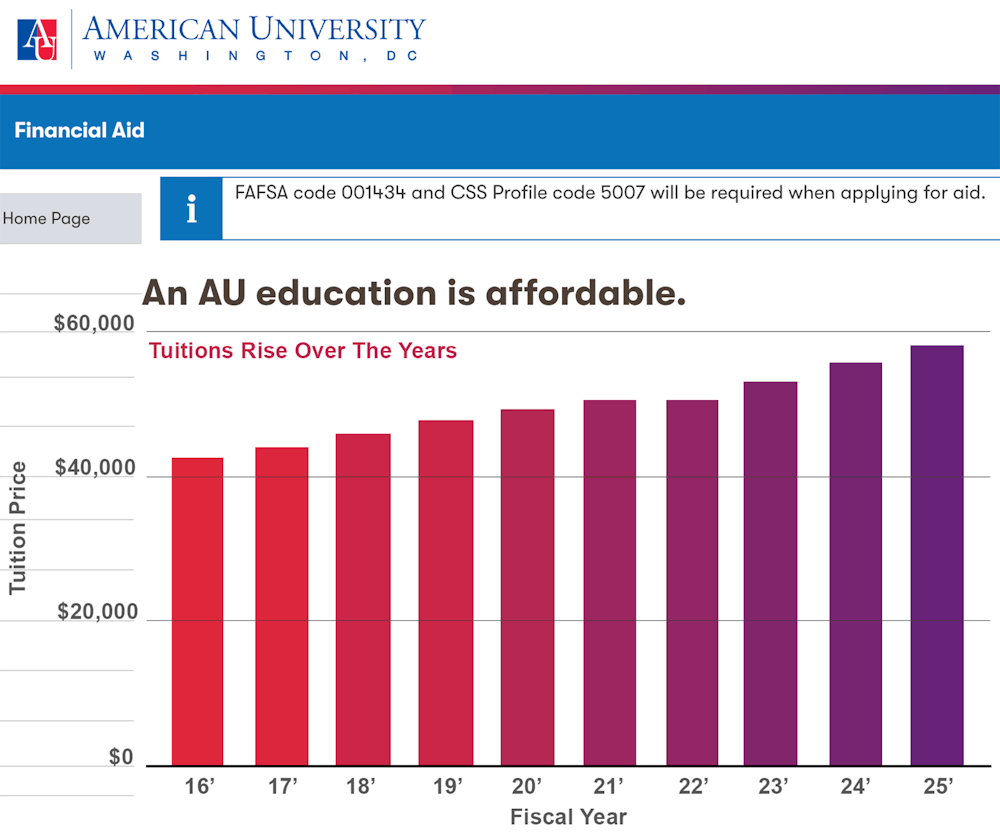From the Newsstands: This story appeared in The Eagle's April 2025 print edition. You can find the digital version here.
Following its annual budget report for the fiscal year of 2025, American University President Jonathan Alger and Chief Financial Officer Bronté Burleigh-Jones announced that tuition would increase by 4 percent, with a 4.5 percent increase for on-campus housing and an 8 percent increase for meal plans, leaving many students wondering where their money is going.
“I don’t know what my money is going toward,” said Maggie Cejne, a sophomore in the School of Public Affairs. “This is already an increasingly expensive institution, so I don’t think it’s warranted to be honest.”
According to the report, tuition was 5.9 percent higher than last year, making up 78 percent of the University’s $860.4 million in revenue. However, last year’s annual budget report shows the University made $894.1 million in revenue, 80 percent of which was from student tuition. In the 2023-2024 fiscal year, tuition increased by 5 percent.
Most universities increase tuition each fiscal year. George Washington University increased its tuition by 3.5 percent and Georgetown University increased it by 4.9 percent for the 2025-2026 academic year.
Still, students are wondering where this revenue is going. Matt Wingen, a sophomore in SPA, said that the University is already expensive and the lack of direct benefits from the increases can make it feel “like a waste” to go here.
Lileia Olson, a sophomore in the College of Arts and Sciences, said she wonders why the University continues to increase tuition when it continues to suffer from a lack of student-generated revenue, as seen in its $68 million budget shortfall.
Olson said the impact of this budget deficit on students, such as the potential restructuring of the School of Education before a gift from H. Kent Baker, leaves her wondering, “Where is our money going if there are things that we are continually losing, too?”
Emma O’Hara, a junior in SPA, pointed out that the University now requires students to live on campus for their first two years. She doesn’t see why tuition needs to be increased when “[the University] is going to make money from that.”
Wingen said the budget deficit alludes to a larger issue of a lack of transparency from the University on its finances. Although the University reports on its annual budget via email, Wingen said there needs to be more consistent communication on these changes.
O’Hara said she only knew about last year’s tuition increase when she saw the billing information for the next academic year. The University emailed the community on March 4, 2024, about the increase for the next academic year.
“[The University doesn’t] tell you that it’s increasing early enough, especially for students who can’t handle that 4 percent increase, who would then have to consider different options,” O’Hara said. “They don’t have time to transfer, they don’t have time to apply for scholarships. It just needs to be communicated more effectively.”
This article was edited by Cara Halford, Tyler Davis and Abigail Turner. Copy editing done by Luna Jinks, Emma Brown, Sabine Kanter-Huchting, Nicole Kariuki, Ella Rousseau, Ariana Kavoossi, Hannah Langenfeld and Charlie Mennuti. Fact Checking done by Luna Jinks, Olivia Citarella and Tatiana Pruss.
features@theeagleonline.com





